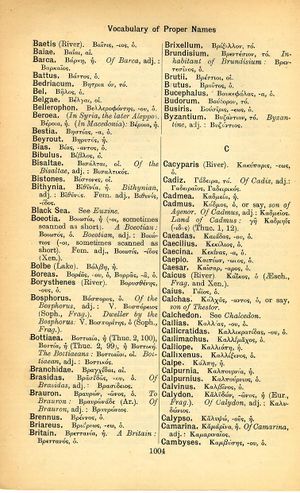Briareus
καλῶς γέ μου τὸν υἱὸν ὦ Στιλβωνίδη εὑρὼν ἀπιόντ' ἀπὸ γυμνασίου λελουμένον οὐκ ἔκυσας, οὐ προσεῖπας, οὐ προσηγάγου, οὐκ ὠρχιπέδισας, ὢν ἐμοὶ πατρικὸς φίλος → Ah! Is this well done, Stilbonides? You met my son coming from the bath after the gymnasium and you neither spoke to him, nor kissed him, nor took him with you, nor ever once felt his balls. Would anyone call you an old friend of mine?
English > Greek (Woodhouse)
Βριάρεως -εω, ὁ.
Latin > English (Lewis & Short)
Brĭăreus: (trisyl.), ei, m., = Βριαρεύς, Callim. Del. 143 (old form Βριάρεως>, Hom. Il. 1, 403; v. Crus. Wb. of Prop. Names),
I the hundred-armed giant, also called Ægœon: centumgeminus, Verg. A. 6, 287 Serv. and Heyne; cf. id. ib. 10, 565: ferox, Luc. 4, 596 Schol.: immensus, Stat. Th. 2, 596; cf. also Ov. M. 2, 10; Claud. Laud. Stil. 1, 304: vastus, Sen. Herc. Oet. 167.—Hence, Brĭă-rēĭus, a um, adj., of or belonging to Briareus: turba, Claud. Rapt. Pros. 3, 188.

